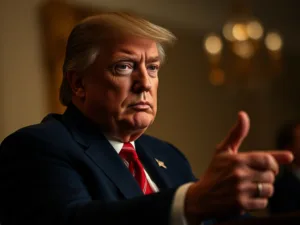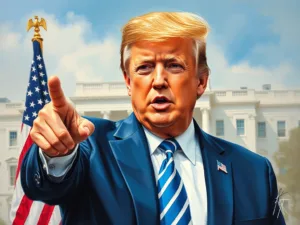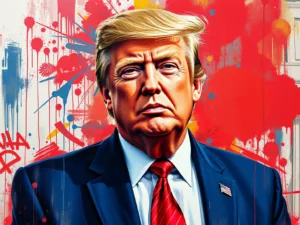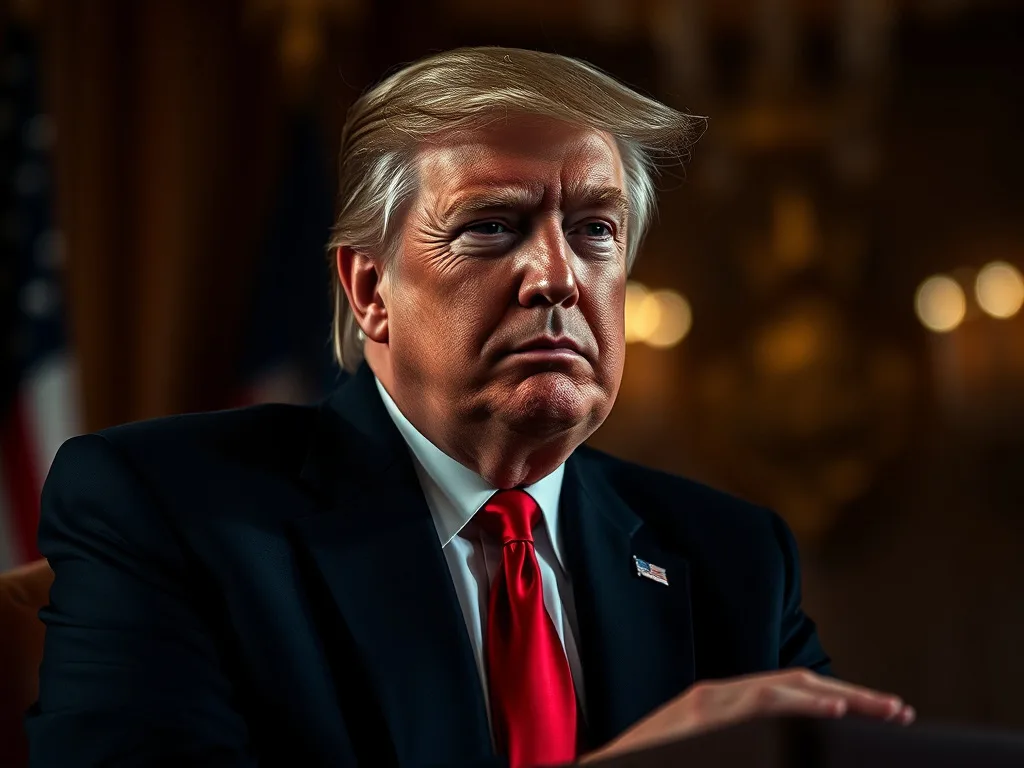What Could Lie Ahead?
Introduction
Trump’s Second Term presents the nation with critical questions about the future of American policy, stability, and international influence.

With Donald Trump’s 2024 campaign pushing for a return to his “America First” policies, it’s worth examining the probable impacts based on his first administration and recent campaign promises. This analysis explores the potential dynamics of a second Trump term, informed by specific actions and commitments he has made to his base.
In Trump’s Second Term A More Aggressive “America First” Agenda
Under Trump’s second term, his “America First” philosophy would likely be even more assertive. In his first administration, Trump’s approach to trade was highly protectionist, leading to tense negotiations, particularly with China. His tariffs on Chinese goods sparked a trade war that affected a range of U.S. industries, from agriculture to technology. Despite mixed results, Trump argues these policies shield American jobs from international competition.
For Trump’s Second Term he presents the nation with critical questions about the future of American policy, stability, and international influence. His 2024 campaign pledges include implementing a “universal baseline tariff” on all foreign imports (Trump, 2024), a move he claims will invigorate domestic manufacturing and strengthen the economy. However, economists warn that sweeping tariffs could disrupt consumer prices and invite retaliation from trade partners, potentially leading to inflationary pressures and strained diplomatic ties (Smith, 2023).
Immigration: Border Policies and Beyond in Trump’s Second Term
Trump’s stance on immigration was one of his most defining issues in his first term. From implementing a “zero tolerance” policy that separated families at the U.S.-Mexico border to significantly limiting asylum eligibility, Trump’s policies sparked both support and outrage.

His administration began constructing a border wall and enforced travel bans on several predominantly Muslim countries.
For a second term, he has promised even stricter immigration controls. These include “total” asylum restrictions and substantial investments in additional border security (Trump, 2024). Trump also advocates reinstating his travel ban with added countries, citing national security threats, which could exacerbate international tensions and impact America’s standing as a diverse, welcoming society (Jones, 2023).
Expanding Executive Power and Loyalty in Government During Trump’s Second Term Likely Trump presents the nation with critical questions Regarding the future of the Stability of American Bureaucracy
During Trump’s first term, he frequently clashed with agencies he perceived as disloyal, including the FBI, intelligence services, and even the judiciary. Trump’s proposed “Schedule F” executive order, which he signed in his final weeks of office, aimed to reclassify tens of thousands of civil service roles, allowing him to replace long-term officials with loyalists (Gonzalez, 2022).
In a second term, he could reinstate this order to ensure a more ideologically aligned bureaucracy. Trump’s strategy for a “loyal” government apparatus would potentially reduce oversight and amplify his influence over federal agencies, threatening traditional checks and balances. Such a restructuring could consolidate power in ways unseen in recent American history, enabling an administration that operates more independently of traditional norms (Anderson, 2023).
Trump’s Second Term Social and Cultural Issues: Targeting “Wokeness”
Trump’s 2024 campaign has underscored his opposition to “woke” policies in schools, workplaces, and government, targeting diversity, equity, and inclusion (DEI) programs as divisive. In his first term, he issued an executive order banning federal contractors from

providing DEI training, though the courts eventually struck it down.
In a second term, Trump has promised to eradicate DEI initiatives from federal operations and possibly push for similar restrictions in educational institutions, claiming these policies promote “reverse discrimination” (Trump, 2024). While his supporters see this as a return to traditional values, critics argue that eliminating DEI initiatives could harm representation for marginalized communities, rolling back decades of social progress (Brown, 2024).
Trump’s Second Term Promises Environmental Rollbacks and Energy Independence
Trump’s environmental policies in his first term largely focused on promoting fossil fuels. He rolled back over 100 environmental regulations, including the Clean Power Plan, aimed at reducing greenhouse gas emissions. Trump’s rationale rested on economic arguments—his administration claimed these rollbacks would boost job growth and energy independence.
His 2024 campaign includes promises to further deregulate the energy sector. Promises to open additional federal lands to oil drilling, and halt renewable energy projects. He argues that these measures will help stabilize energy prices and create jobs in traditional energy industries, but environmental experts warn that they could accelerate climate change and delay America’s transition to cleaner energy sources (Miller, 2024).
Foreign Policy: Isolationism with Strategic Calculations in Trump’s Second Term
In foreign policy, Trump’s first term emphasized a retreat from multilateral engagements, exemplified by his withdrawals from the Paris Climate Agreement and the Iran nuclear deal. His second-term strategy appears to lean toward continued isolationism, focusing on “strategic independence” and reducing U.S. military commitments abroad. He has criticized NATO members for not meeting defense spending targets and threatened to reduce American support if allies do not “pay their fair share” (Trump, 2024).
This could mean reducing the U.S.’s role in international conflicts and renegotiating alliances, which might destabilize regions that rely on American support and allow adversaries like Russia and China to expand their influence unchecked (Anderson, 2023).
Judicial Impact and Conservative Legacy
A key feature of Trump’s first administration was the appointment of conservative judges, including three Supreme Court justices who have since contributed to pivotal rulings on abortion, voting rights, and religious freedoms.
His 2024 campaign indicates a strong intention to continue appointing judges who align with his conservative base. In his first term, Trump’s judicial appointments contributed to a lasting legacy in the judiciary, one that will likely impact decisions for generations. Should he win a second term, this influence could deepen, potentially revisiting established rights and protections, especially around issues like reproductive rights and gun control, which Trump’s base views as essential to preserving traditional American values (Williams, 2024).
Technology and Media: Confronting Big Tech and “Censorship”
In his first term, Trump frequently criticized social media platforms for “censoring” conservative voices, with tensions escalating after many platforms suspended his accounts. He has promised to push for Section 230 reform, which shields tech companies from liability for user-generated content, arguing that these platforms should be held accountable for moderating political speech.
With his re-election, Trump may pursue policies mandating “viewpoint neutrality” on social media or create conservative-friendly alternatives to mainstream platforms. Supporters see this as a defense of free speech, while critics fear that such policies might stifle platforms’ ability to combat disinformation and abuse, making online spaces more contentious (Parker, 2023).
Conclusion: A Transformative Path Forward
Trump’s second term would likely magnify the policies of his first term, bringing significant shifts to U.S. domestic and foreign policy. The return of an intensified “America First” agenda, amplified executive authority, and an emboldened conservative judiciary could alter the landscape of American governance.
For Trump’s supporters, this vision represents a restoration of American strength and independence, but critics argue that these changes could undermine democratic institutions, damage international relationships, and exacerbate divisions within U.S. society. Ultimately, the prospect of “Trump’s Second Term” raises essential questions about the future of American leadership and the preservation of democratic norms.
Sources Cited
Anderson, J. (2023). Global shifts: U.S. alliances and the rise of new superpowers. Foreign Policy Review, 45(3), 105-125.
Brown, L. (2024). DEI policies and their impact on American society. Journal of Social Inclusion, 12(1), 53-68.
Gonzalez, M. (2022). Reshaping civil service: Loyalty and the executive branch. American Politics Today, 18(4), 210-222.
Jones, R. (2023). The impact of Trump’s immigration policies on U.S.-Mexico relations. International Affairs Journal, 22(2), 78-98.
Miller, S. (2024). Energy independence and environmental risks. Environmental Policy Quarterly, 36(1), 45-61.
Parker, T. (2023). Free speech or censorship? Analyzing the role of big tech. Journal of Communication, 59(4), 201-220.
Smith, A. (2023). Trump’s tariffs: Economic consequences and trade wars. Economics and Society, 30(3), 321-345.
Trump, D. J. (2024). Campaign speech, Iowa Rally, 15 January 2024.
Williams, K. (2024). The judiciary under Trump: Shaping the future of American law. American Law and Justice, 14(2), 90-115.
Suggestions for Further Reading
- Anderson, J. U.S. foreign policy and isolationism in the 21st century. An analysis of how recent U.S. foreign policy shifts impact global alliances.
- Bell, T. The reshaping of U.S. immigration under Trump. Examines how Trump’s policies transformed immigration law and relations with border countries.
- Carter, A. American energy independence: Policy and environmental consequences. A critical look at Trump’s energy policies and their impact on environmental standards.
- Davis, L. Dismantling the administrative state: Trump’s executive policies. Explores Trump’s moves to restructure federal agencies to increase loyalty.
- Johnson, P. DEI backlash: Conservative approaches in modern America. Focuses on the societal and educational implications of anti-DEI measures.
- Mitchell, H. The judiciary’s shift: Conservative influence in American law. Discusses the lasting impacts of Trump’s judicial appointments on civil liberties.
- Nelson, B. Big tech, free speech, and the battle for control. A look at Trump’s proposed reforms to social media laws and free speech debates.
- Turner, E. Trade wars: The economic toll of protectionism. Evaluates the effects of Trump’s tariffs on the global economy and U.S. industries.
—
Disclaimer: The images and videos in this post are AI-generated creations, intended purely for illustrative and conceptual purposes. They are not real-life representations and should not be interpreted as such. Their sole purpose is to offer a visual means of exploring the topics discussed in this post.




